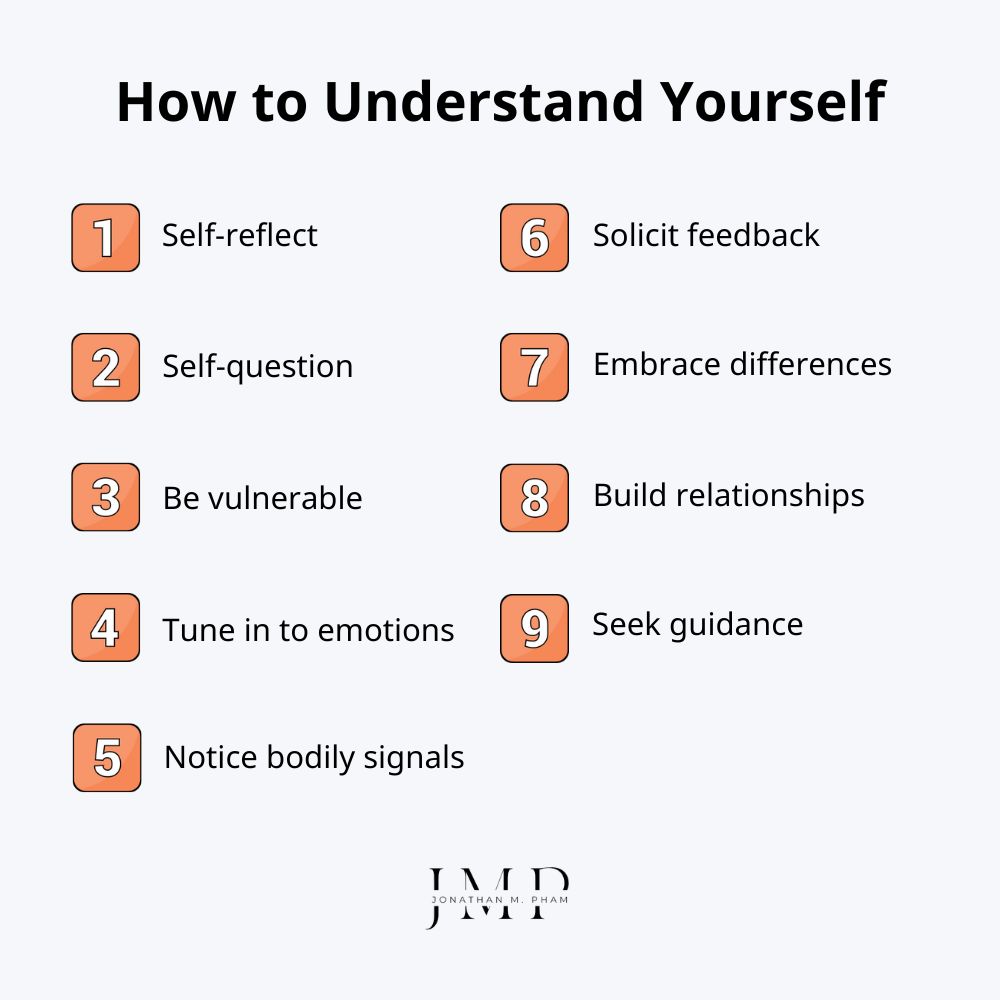Explore practical insights to better understand yourself – including emotions, values, and motivations – for a more fulfilling and authentic YOU.
The journey of understanding yourself is a winding path, often shrouded in confusion and self-doubt. But take heart! In this article, we will delve into practical tools and insightful practices to illuminate your emotions, decipher your values, and finally, meet the authentic YOU waiting to be discovered.
Highlights
- Understanding yourself involves a deep exploration of your inner world, outer interactions, and life experiences to discover your values, emotions, thoughts, strengths, weaknesses, relationships, personality, and aspirations. The results of this process are increased self-awareness, improved relationships, personal growth, and a greater sense of inner peace, purpose, and empowerment.
- Self-understanding encompasses introspective, interpersonal, and physical awareness. It progresses through 5 distinct levels: superficial self, psychological self, relational self, values-driven self, and spiritual self.
- Our difficulty in attaining self-knowledge stems from a combination of various factors, including fear of the unknown, ego and defense mechanisms, cognitive biases, emotional discomfort, social conditioning, limited self-awareness, cultural influences, and constant personal change.
- Our personality, values, thoughts, relationships, culture, upbringing, and continuous learning all play a role in shaping our self-perception.
- Understanding yourself requires internal exploration through self-reflection, challenging assumptions, embracing vulnerability, connecting with emotions, and paying attention to the body – as well as external interactions through seeking feedback, engaging in diverse experiences, building supportive relationships, seeking professional guidance, utilizing personality tests, journaling prompts, exploring books and articles, and engaging in creative outlets.
What Does Understanding Yourself Mean?
Understanding yourself means having a vivid, detailed perception of who you are as a person. It involves being aware of your thoughts, feelings, actions, and motivations, plus how they impact your life and relationships.
Self-understanding is a continuous process that goes beyond knowing your favorite color or remembering your birthday. Specifically, it’s about delving deeper into:
- Your inner world:
- Values & beliefs: What defines your right from wrong? What fuels your passions? What gives your life meaning?
- Emotions & triggers: Recognizing what makes you happy, sad, angry, or scared, and the underlying reasons behind these feelings.
- Thoughts & patterns: Examining your self-talk, biases, and mental frameworks to discover how you interpret the world and yourself.
- Strengths & weaknesses: Identifying your abilities, talents, and areas for improvement, both personal and professional.
- Your outer interactions:
- Relationships: How do you connect with others? What dynamics do you tend to create? What roles do you play in different relationships?
- Personality & communication: Understanding your communication style, social preferences, and how you navigate different situations.
- Life experiences: Analyzing how past experiences, both positive and negative, have shaped who you are today.
- Goals & aspirations: Knowing what you want out of life, what motivates you, and what kind of person you want to become.
The process requires ongoing introspection, self-questioning, and a willingness to be honest with yourself, even about the less flattering aspects (e.g. fear of failure, the need for constant validation, arrogance, tendency to find fault in others, etc.). As challenging as it may seem, it is the key to unlocking your potential and living a more harmonious, authentic life.

Understanding yourself psychology
Signs of Understanding Yourself
- Increased self-awareness:
- Being able to recognize and name your emotions: You notice your inner state and understand what triggers particular feelings, plus how they impact your behavior. As such, you become better equipped to compose yourself more effectively.
- Identifying your needs and wants: You know what brings fulfillment and what drains you, and are able to set priorities accordingly.
- Understanding your thought patterns and biases: You recognize your internal narratives and challenge them if they’re unhelpful or inaccurate. When reflecting on previous experiences, you can analyze why you did something, what the consequences were, and what should be done differently next time.
- Taking responsibility for your actions: You acknowledge your role in different situations and choose your responses consciously.
- Improved relationships:
- More authentic communication: You express your needs and emotions clearly, listen actively to others, and value healthy communication.
- Stronger, healthier relationships: You attract and nurture connections based on mutual respect and understanding.
- Setting healthy boundaries: You know your limits and don’t hesitate to politely say no when something may compromise your well-being.
- Feeling comfortable being yourself around others: You embrace your individuality and feel accepted for who you are.
- Personal growth:
- Making choices aligned with your values and goals: You pursue meaningful, realistic targets that contribute to your long-term vision.
- Enhanced self-acceptance and confidence: Instead of feeling insecure/ being arrogant/ comparing yourself to others, you appreciate both your own uniqueness and what needs to be worked on.
- Being open to learning and growth: You embrace new experiences and opportunities for personal development. Feedback, criticism, and failure are deemed as success facilitators rather than obstacles.
- A sense of purpose and direction in life: You understand your role and contribution to the world, living with a sense of meaning and fulfillment.
- Additional signs:
- You find yourself less easily swayed by external opinions and pressures.
- You experience a greater sense of inner peace and calmness.
- You feel more empowered and capable of navigating challenges.
- You find it easier to forgive yourself and others.
- You have a greater appreciation for the present moment.
- etc.
Why is Understanding Yourself So Important?
- Key to success
Self-understanding means a lot more than academic qualifications. Being aware of your biases and thought patterns enables you to analyze situations more objectively, make sounder decisions, and extract valuable lessons from previous experiences. For example, a manager who recognizes their bias towards those with similar backgrounds and their preference for quantitative data may actively seek feedback from team members with different perspectives and make decisions based on a broader range of information.
Additionally, you become more capable of regulating your feelings and remaining resilient – even in the face of uncertainties and societal expectations. This facilitates inner peace and the pursuit of things that align with your authentic self.
When you know your strengths, weaknesses, values, and passions, you are better equipped to set goals that are truly aligned with your authentic self – rather than resorting to impulsive choices. For instance, knowing that you are passionate about empowering others may prompt you to pursue a career path that revolves around coaching, mentoring, and training (rather than a purely high-income job). This focus and direction means a higher chance of achieving success in areas that matter most to you.
- Effective communication & deeper connections
Understanding both your own needs and those of others contributes to fostering deeper, more authentic connections with friends, family members, and colleagues. Knowing your limits and respecting those of others enables you to set and enforce healthy boundaries (e.g. not taking additional work that may compromise one’s emotional well-being and other commitments), thereby reducing unnecessary resentment and conflict.
Not to mention, when you’re true to yourself, you attract people who appreciate your authentic self, resulting in more genuine and supportive interactions.
- Improved well-being & fulfillment
Research by the Harvard Business Review has revealed a strong correlation between the level of understanding oneself and overall well-being. Being able to regulate your inner state brings tranquility and satisfaction, as well as helps cope with stress/ other negative emotions in work and life.
- Better leadership performance
Self-understanding is a cornerstone of effective leadership, especially during times of crisis. According to a study by McKinsey, leaders who demonstrate high awareness of themselves (referred to as “centered leadership”) are 4 times more capable of navigating change than those who do not. This may be attributed to the increase in adaptability, decision-making effectiveness, resilience, etc. that stems from self-knowledge.
- Fueling self-discovery & continuous evolution
As you gain awareness of your thoughts, emotions, values, and motivations, you naturally embark on a lifelong quest to uncover more about yourself. This constant process of reflection and exploration leads to new insights and a deeper understanding of who you are at your core.
For instance, let’s say you’re someone who has always been a people-pleaser. You’ve noticed that you often prioritize others’ needs over your own, which has been causing feelings of overwhelm lately. You then recognize that this pattern of behavior stems from a deep-rooted fear of rejection and a desire to be liked by everyone. Although your core values are connection and belonging, the current methods of achieving this have been misguided. This newfound understanding motivates you to explore healthier ways to connect with others – while also setting boundaries for yourself.
Understand yourself before understanding others
Understanding yourself paves the way for success
The best leaders are not afraid to look inward and chart their own course
Read more: Self-leadership – The Art of Leading from Within
Types of Understanding the Self
Introspective awareness
- Thoughts and emotions
Awareness of your thoughts involves examining the internal dialogues, recognizing biases/ patterns, and naming the mental frameworks that trigger feelings. Think of it as shining a light on the inner workings of your mind.
- Values and beliefs
What gives your life meaning? What principles guide your actions? Identifying your core values is like finding the compass that steers you in the right direction.
- Strengths and weaknesses
Recognizing your talents and limitations is crucial for making informed choices and setting realistic goals. It’s about embracing your unique blend of light and shadow.
- Life experiences
How have previous experiences shaped who you are today? Reflecting on the past reveals patterns and lessons that may be leveraged to make better choices in the future and grow as a person.
For example, let’s say there’s a person named John, who has spent 10 years in marketing. He realized he often felt stressed during campaign launches and preferred the analytical aspects of his role.
Through reflection, John identified a pattern of seeking roles with high-pressure, deadline-driven responsibilities. He learned that while he enjoyed the adrenaline rush initially, long-term job satisfaction stemmed from data analysis and strategic planning. Armed with this knowledge, John decided to pursue a career shift by enrolling in a data science course and networking with professionals in the field.
Read more: Living in the Past – The Problem of Dwelling on What Was
- Goals and aspirations
What do you want out of life? What are you working toward? Connecting your individual aspirations to a larger sense of purpose brings direction and fulfillment into your life.
Interpersonal awareness
- Relationship dynamics
How do you connect with others? What roles do you play in different relationships? Recognizing your patterns in social interactions is essential for cultivating stronger, healthier bonds – as well as for developing empathy and navigating social situations with greater ease.
- How others perceive you
Seeking feedback from trusted friends and coaches/ mentors sheds light on how you come across to others – which is an invaluable tool for self-improvement.
Read more: Self-coaching – The Art of Being Your Own Coach
- Communication style
Being aware of how you interact with others lays the foundation for tailoring your messages for maximum impact. For example, you’re a naturally analytical person (Analytical communication style) – who prefers data, logic, and structured information. As a result, when presenting a new project, you might lean towards a detailed, data-driven approach. However, if your audience is primarily creative or emotionally driven, they might struggle to connect with your message.
In this case, rather than diving straight into numbers, you might start by painting a picture of the problem the project solves, and then support your points with data.
- Role in society
What is your contribution to society? How can you make a positive impact on the world?
Example:
“I can contribute to society by being a dedicated teacher. I help shape young minds and prepare them to be responsible citizens.”
Physical awareness
- Your body
This includes being aware of your physical health, energy levels, and the body’s needs – so as to better take care of your physical well-being and refrain from unhealthy habits (e.g. overconsumption of snacks/ caffeine, etc.), thereby resulting in improved health and happiness.
- Your senses
How do you experience the world through your senses? Do you appreciate the beauty of the world around you?

Levels of Understanding Yourself
- Level 1: The Superficial Self
- Focus: External self – physical appearance, social media persona, superficial interests.
- Metaphor: Looking in the mirror – you see your reflection but not the depths within.
- Examples: “I’m a great cook,” “I love traveling,” or “I’m the life of the party.”
- Level 2: The Psychological Self
- Focus: Internal thoughts, feelings, and emotions.
- Metaphor: It’s like exploring a house – you begin to understand the rooms and furniture, but the foundation and hidden chambers remain unknown.
- Examples: “I get anxious when I speak in public,” “I love feeling challenged,” or “I’m easily hurt by criticism.”
- Level 3: The Relational Self
- Focus: How you interact with others, the roles you play in relationships.
- Metaphor: Building a city – you understand the streets and neighborhoods, but the larger ecosystem and interconnectedness are still being discovered.
- Examples: “I’m a supportive friend,” “I’m a natural leader,” or “I struggle with boundaries in relationships.”
- Level 4: The Values-Driven Self
- Focus: Core values, beliefs, and guiding principles.
- Metaphor: Charting a course on a map – you can identify your destination and plot the course, but unforeseen storms and detours may arise.
- Examples: “I value honesty and integrity,” “My mission is to help others,” or “I believe in environmental sustainability.”
- Level 5: The Spiritual Self
- Focus: Connection to something bigger than oneself, a sense of purpose.
- Metaphor: Gazing at the stars – you contemplate the vastness of the universe and your place within it.
- Examples: “I feel connected to nature,” “I believe in a higher power,” or “My purpose is to leave the world a better place.”
Why is Understanding Yourself So Hard?
Despite the various benefits mentioned above, many of us struggle with understanding who we really are – which can be attributed to a variety of reasons:
Internal barriers
- Fear of the unknown
Our inner world is a vast and unexplored territory. Diving into it often proves to be scary, as we might uncover truths about ourselves that are uncomfortable or challenging.
For instance, imagine someone who always presents themselves as confident and outgoing; however, deep down, they might fear vulnerability and rejection. To protect this image, they avoid situations that could expose their insecurities. This fear of uncovering their “true self” prevents them from authentic connections and personal growth.
Overcoming the problem requires courage and self-compassion. Specifically, one needs to create a safe space for exploration, challenge negative self-talk, and gradually build self-awareness.
- Ego and defense mechanisms
Our ego often protects us from negative self-perception, creating blind spots and distorting our self-image. As such, we tend to resist examining aspects of ourselves that threaten our sense of self-worth.
Read more: The Excessive Need to Be Me – When the Ego Takes Over
- Cognitive biases
Our brains are wired for efficiency and often take shortcuts in processing information. These biases lead us to misinterpret our experiences and draw inaccurate conclusions about ourselves.
Consider someone who prides themselves on being always in control. Their ego might prevent them from acknowledging feelings of insecurity or fear of failure. To maintain their image of competence, they might avoid taking risks or seeking help, hindering their personal and professional growth.
It’s essential to recognize that acknowledging our flaws and vulnerabilities is not a sign of weakness but an essential step toward true knowledge.
- Emotional discomfort
When we turn our attention inward, we risk encountering aspects of ourselves that we’ve tried to bury or avoid. These emotional wounds can be difficult to face, and the discomfort they bring often breeds a strong resistance to further exploration.
On the other hand, self-awareness often leads to insights and realizations that require changes in our behavior or beliefs. This prospect can be quite frightening, as it involves stepping outside of our comfort zone.
Read more: Healing Your Inner Child – A 15-step Guide

External challenges
- Social conditioning
In today’s world – given the rise of social media and a materialistic mindset, we are constantly bombarded with messages about who we should be, what we should achieve, and how we should behave. These external pressures – despite the intentions behind them – make it challenging for many of us to connect with our authentic selves.
- Limited self-awareness
Most of us are not taught how to effectively reflect on our thoughts, feelings, and motivations. No wonder why we often lack the skills necessary for self-understanding.
- Cultural influences
Different cultures have different values and priorities, which partially shape how we see ourselves and interact with the world. In individualistic cultures like the United States, self-reliance and personal achievement are often emphasized. Individuals may define themselves based on their accomplishments and unique qualities.
In contrast, collectivist cultures like Japan prioritize group harmony and interdependence. People’s identity is often intertwined with their social roles and relationships, making it difficult to separate personal desires from group expectations.
To overcome this challenge, one needs to develop cultural awareness, practice empathy, learn to appreciate differences, and engage in continuous self-reflection.
- Constant change
As individuals, we undergo physical, emotional, and cognitive transformations throughout our lives. Our experiences, relationships, and even our environment all contribute to this ongoing process of change. What felt true about us yesterday may no longer apply today, making it difficult to hold onto a fixed sense of self (and potentially giving rise to issues such as identity crisis).
Flexibility and self-compassion serve as anchors as one navigates the constant state of flux in life. Additionally, it also helps to identify your core values that remain consistent despite external changes.
Despite the challenges mentioned above, the journey of self-understanding is still within our reach – and ultimately rewarding. After all, the key is to never stop exploring and learning.
Read more: 45 Daily Mindfulness Questions for Adults
The art of understanding yourself in life
Factors that Contribute to Understanding Yourself
- Personality
The combination of your innate traits (e.g. introversion vs extroversion), emotional responses (temperament), and personal preferences plays a major role in shaping your thoughts, feelings, and actions. Recognizing it may shed light on your behavioral patterns (e.g. why you prefer quiet environments, why you need alone time to process information, why you’re drawn to intellectually stimulating activities, etc.) – based on which you become better equipped to make informed choices about your career, relationships, and lifestyle.
- Values and beliefs
These form the foundation of your moral compass and guide every decision. Understanding them is crucial to making choices that align with your authentic self (e.g. choosing actions that align with truthfulness if honesty is a core value of yours).
- Thoughts and cognitive biases
Our internal narratives and mental frameworks play a major part in shaping our perception of the world and ourselves. Do you often engage in positive or negative self-talk? Do you tend to seek out information that confirms your existing beliefs while ignoring contradictory evidence? Do you overemphasize personal factors and underestimate situational factors when explaining others’ behavior?
Read more: Passing Judgment – Why We Must Stop This Destructive Habit
- Relationships
The people you surround yourself with often leave a significant impact on your self-perception and self-development. Healthy, supportive relationships encourage self-reflection and personal growth, while toxic ones produce opposite results.
- Culture and social environment
Cultural norms, societal expectations, and social roles can significantly shape your identity and influence behavior.
- Upbringing and family dynamics
Childhood experiences and family dynamics all contribute to one’s emotional patterns, self-beliefs, and communication styles. For instance, someone raised in a highly critical and controlling family environment might develop low self-esteem and a tendency to people-please. They might also struggle with assertiveness and have difficulty setting boundaries.
Examining these influences is crucial to knowing one’s emotional triggers and making conscious choices in the present life.
- Learning and education
Continuous learning, challenging yourself with new experiences, and engaging in introspective activities like journaling or therapy all contribute to accelerating the self-discovery process.

Tips to Understanding Yourself Better
I am who I am.
There’s no single recipe for truly understanding yourself, as it’s a lifelong journey with unique paths for each individual. However, here are some practical tips and resources to guide you on your self-discovery adventure:
Internal exploration
- Engage in self-reflection
Practice journaling, meditating, or spending time in introspection to ponder your thoughts, feelings, and motivations. Ask yourself questions like: “What are my values?”, “What brings me joy?”, “What fears are holding me back?”.
- Challenge your assumptions
We often develop a self-image based on past experiences, societal expectations, and personal beliefs. Despite providing a comfortable, familiar identity, it might not accurately reflect who you truly are or what you are capable of. Hence, don’t take it at face value.
For example, let’s say you’ve always believed you’re shy and introverted. This belief might have shaped your behavior over the years, leading you to avoid social situations. Instead of accepting “I’m shy” as a fact, ask yourself:
“Is this truly accurate in all situations? Are there instances where I’ve been outgoing or comfortable socializing?”
Additionally, reflect on past experiences where you might have stepped outside your comfort zone. Were you successful? How did you feel? Consider talking to friends or family about their perception of you as well. Do they see you as shy? Could there be other aspects of your personality that are more prominent?
- Embrace vulnerability
Explore both your strengths and weaknesses, and acknowledge your shadows. Accepting your whole self, flaws and all, is crucial for authentic self-knowledge.
- Connect with your emotions
Being attentive to your feelings, recognizing their triggers, and learning healthy coping mechanisms will enable you to regulate emotions effectively and nurture stronger relationships.
- Pay attention to your body
Our bodies are incredibly intelligent and responsive to our emotional and mental states. Physical sensations like tension, pain, or energy levels often reflect what’s happening inside. By tuning into these signals, we may gain valuable insights into our emotions, needs, and overall well-being.
Imagine you’re feeling stressed about an upcoming deadline. You might notice tension in your shoulders, a racing heart, or difficulty concentrating. These physical sensations are your body’s way of telling that you’re feeling overwhelmed.
Instead of ignoring these signals, try a body scan meditation. Focus on each part of your body, from your head to your toes, noticing any sensations. This should help pinpoint the source of the tension and find ways to relax, such as deep breathing or stretching.
Read more: Subconscious Mind Power – Exploring The Hidden Force Within

External interactions
- Solicit feedback
Ask trusted friends, family, or mentors for honest feedback on your strengths, weaknesses, and how you come across to others. Their input may yield unique perspectives you might not have considered before.
- Engage in diverse experiences
Step outside your comfort zone and try new things. Explore different cultures, hobbies, and social settings. The more new experiences you are exposed to, the easier it is to realize hidden talents, challenge your existing perspectives, and lead to greater self-understanding.
- Build supportive relationships
Surround yourself with people who encourage your self-exploration and celebrate your individuality. Healthy relationships provide a safe space for vulnerability and honest feedback.
- Seek professional guidance
Consider therapy or coaching if you’re facing specific challenges or want deeper insights into your inner world. A trained professional should be able to provide expert guidance and support in your self-discovery journey.
Read more: Asking for Help – The Power That Comes From Vulnerability
Additional resources
- Personality tests
Tools like Myers-Briggs, Enneagram, DISC, Jordan Peterson, or the Leonard Personality Inventory (LPI) offer amazing insights into your traits and preferences. Though they are not definitive, all provide a great starting point for self-exploration.
- Journaling prompts
Find prompts that encourage deeper reflection on specific aspects of yourself, such as your values, relationships, or past experiences.
- Books and articles
Explore self-help books, articles, and online resources on self-discovery and personal growth. With these, you should be able to find inspiration and practical advice from others who have walked similar paths.
- Creative outlets
Express your inner world through artistic endeavors like writing, painting, music, singing, or dancing. Exploring the creativity side often uncovers hidden aspects of yourself and reveals unique insights into your emotions/ life experiences.

How to get a deeper understanding of thyself
Understanding Yourself Quiz & Questions
A mini self-awareness quiz
Answer these questions honestly to gain some insights into your current level of self-awareness:
- How often do you take time to reflect on your thoughts, feelings, and motivations?
- Do you find it easy to identify your strengths and weaknesses?
- Can you name your core values and how they guide your decisions?
- Are you comfortable expressing your authentic self around others?
- Do you struggle with negative self-talk or limiting beliefs?
- When faced with challenges, do you tend to blame yourself or external factors? Do you make excuses for your own wrongdoings? Do you shift your responsibilities onto someone else?
- Do you seek feedback from others and consider it thoughtfully?
- Are you open to new experiences and personal growth opportunities?
By considering your answers, you may realize areas where you feel confident in your self-awareness and areas where you might want to focus your self-understanding efforts.
Deepening self-discovery questions
Go beyond the surface with these prompts to dig deeper into your internal world:
- What brings you the most joy in life?
- What are you most passionate about?
- What are your biggest fears or anxieties?
- What motivates you to get out of bed each morning?
- Who are your role models and why?
- What legacy do you want to leave behind?
- If you could change one thing about yourself, what would it be?
- What does “success” mean to you?
- What is your purpose in life?
These questions may not have immediate answers, but pondering them over time should result in profound realizations about who you are.
Read more: 200 Self-reflection Questions – Toolkit for Life Pilgrims

Books about Understanding Yourself
- Insight by Tasha Eurich: This book explores the concept of self-awareness and its role in improving performance, relationship quality, and happiness. It also introduces practical tips and tools on how to leverage self-awareness and deal with the blind spots and biases that affect one’s self-perception.
- Understanding Yourself and Others – An Introduction to the Personality Type Code by Dario Nardi and Linda Berens: The publication introduces the theory of psychological types, based on the work of Carl Jung and Isabel Briggs Myers. It provides a solid foundation for understanding one’s personality type, as well as those of others, and how they affect one’s communication, relationships, and career.
- Understanding Yourself and Others – An Introduction to the 4 Temperaments by Linda Berens: Within her work, Berens discusses the theory of temperaments, which is helpful for recognizing one’s temperament (plus their impact on our values, needs, and motivations).
- The Power of Understanding Yourself by Dave Mitchell: Mitchell’s book revolves around discovering one’s unique personality based on the DISC model of behavior. As such, readers may have a glimpse into their own strengths, weaknesses, preferences, and blind spots – plus how these affect their performance, relationships, and happiness.
- The Courage to Be Disliked by Kishimi Ichiro and Koga Fumitake: A powerful book that offers a unique perspective on self-understanding. Based on the philosophy of Alfred Adler, it challenges many of our conventional beliefs about ourselves and the world around us. One of the authors’ core messages is that we all have the power to shape our own lives, regardless of our past experiences or circumstances. It’s all about us daring to take responsibility for our choices and actions.
Understanding Yourself Quotes
Knowing yourself is the beginning of all wisdom.
Aristotle
Understanding yourself is power. Loving yourself is freedom. Forgiving yourself is peace. Being yourself is bliss.
Unknown
To find yourself, think for yourself.
Socrates
The most difficult thing in life is to know yourself.
Thales
Your visions will become clear only when you can look into your own heart.
Carl Jung
The journey into self-love and self-acceptance must begin with self-examination… until you take the journey of self-reflection, it is almost impossible to grow or learn in life.
Iyanla Vanzant
The one who cherishes understanding will soon prosper.
Proverbs 19:8

Final Thoughts
Understanding yourself involves a lifelong adventure filled with plenty of opportunities and challenges at the same time. Though there will be ups and downs along the way, it is a journey that will ultimately open the door to a more fulfilling life. The only question is: are you ready to take the first step today?
Other resources you might be interested in:
- Learning to Love Yourself: 16 Handy Tips
- Life of an Introvert: A Few Lines of Personal Reflection
- Habits in Personality Development: A Guide to Mastering One’s Destiny
Let’s Tread the Path Together, Shall We?


